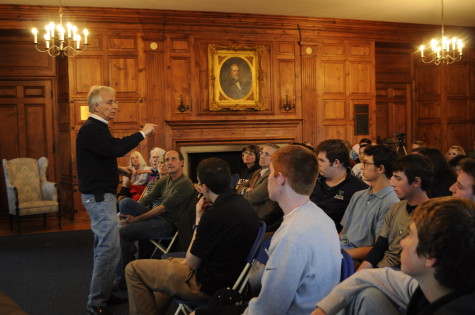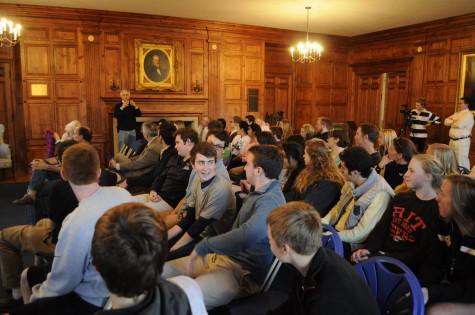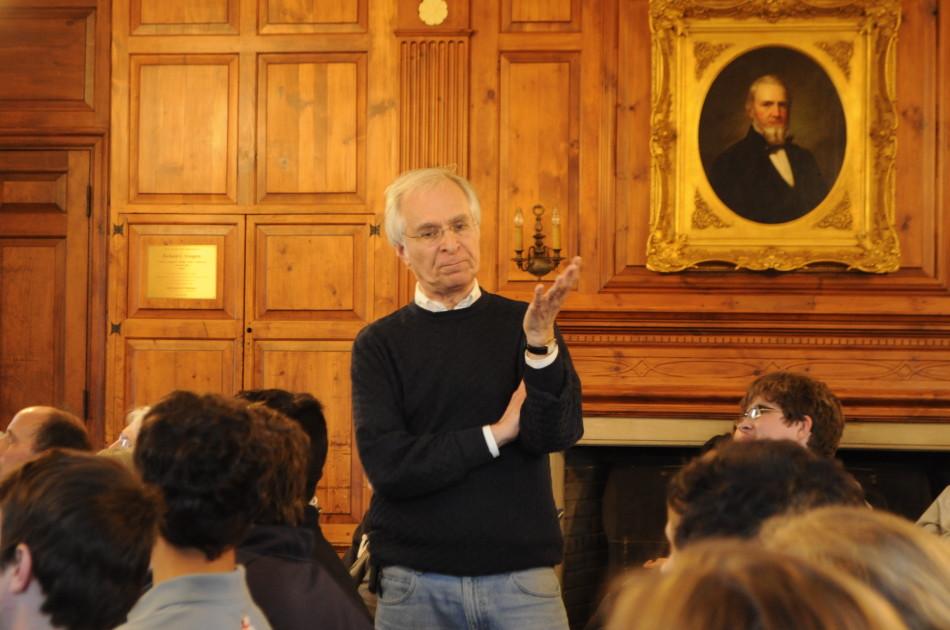Death Penalty Expert Austin Sarat Speaks At Williston
It is not often that the death penalty is a laughing matter in the U.S. But when Amherst College Professor of Political Science and Associate Dean of Faculty Austin Sarat came to speak at Williston on Thursday, April 17th, he kept fifty-five Williston students and faculty entertained while arguing that the death penalty in America will be abolished in the next fifty years.

Sarat came to speak for Williston’s Political Awareness Club (PAC). Its President, Emmett O’Malley ’15, said after Sarat spoke, “If I had to pick one person to come within a 100 mile radius of where we’re standing right now, I think I’d pick him. He brings a thought-challenging presence to campus that’s hard to find. We really want people thinking in new ways, so I think he’s the ideal guy to do that because he talks about a subject that challenges our mindsets.”
Sarat, who is nationally recognized as a leading expert on capital punishment in America, has authored and edited more than fifty books. He is also the father of Williston senior Ben Sarat.
Sarat began the event by asking who in the audience would be attending the opening night of Williston’s new theatrical production, Urinetown, in which his son has a leading role. Unexpectedly, Sarat went over to one of the students who hadn’t raised his hand and asked, “[Are you] in favor of punishing innocent people?” This solicited laughter from the audience, but the student replied, “Innocent people, no, I would not be in favor of punishing innocent people.” Eventually, Sarat said, “Typically people are opposed to punishing the innocent because they are committed to some idea that people should get what they deserve.”
On the topic of deservedness, Sarat also made reference to Amherst College’s grade inflation. “[At] Williston, if you get a 67 percent, what grade do you get?” The crowd answered [you would get a] D.” Sarat replied, “At Amherst you get an A minus!”
Sarat said that he had not come to speak to convince people or argue with people about whether or not the death penalty should be abolished. He wanted to convince people that the death penalty is on its way out.
“I don’t want to tell you a story about what should happen to the death penalty in the United States, I want to tell you a story about what is happening and what is going to happen to the death penalty…The death penalty will be gone from the United States by the time you all [the students] are my age.”
He added, “We can think about people getting what they deserve in a negative sense, as in not being punished if you’re innocent. Or, you can think about it in a positive sense: I worked hard, I did all the work, I was attentive, I submitted everything on Schoology or OneNote or Surface, and I did it with Purpose, Passion, and Integrity. Deservedness, always makes reference to the past, it’s backward looking.”
Sarat quickly changed to the more serious topic, “What I want to say tonight about capital punishment is you have to keep in mind this idea of deservedness. I want to [suggest] that giving people what they deserve is the measure of justice in punishment.”
Sarat told his audience that the nature of America’s society does not support the death penalty. He believes that the death penalty is more of a political than a moral question. “The question of the death penalty is fundamentally a question of democracy… Democracy is a commitment to reversibility. Any punishment which is irreversible is incompatible with democracy.”

Using PowerPoint, he showed images of people who have influenced the debate about the use of the death penalty throughout U.S. history. He also used slides to explain the history of executions—from noose to injection. To strengthen his argument, he presented statistics that prove that the rate of execution in the U.S. has decreased significantly in the past century.
At the end, Sarat took questions from the audience. Before answering his last question he said to the audience, “I would be really grateful if you didn’t move…until I leave. Because I have to dash over to the theater and get my favorite seat, my lucky seat!”








